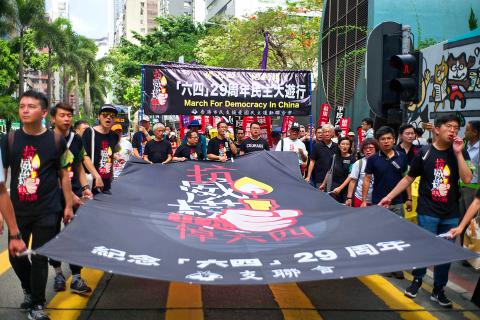Hundreds marched through Hong Kong on Sunday ahead of the 29th anniversary of China’s crackdown on democracy protesters in Beijing’s Tiananmen Square.
Semi-autonomous Hong Kong is the only place on Chinese soil where the anniversary is openly marked with a famous vigil in Victoria Park on June 4 each year. The march is an annual precursor to the main event.
Organized by a group of veteran democracy activists, protesters demanded justice for the victims of the crackdown and also urged the Chinese government to release Liu Xia (劉霞), widow of Nobel Peace Prize laureate Liu Xiaobo (劉曉波), who continues to be under house arrest since her husband’s death in custody last year.

Photo: AFP
Protesters shouted “Accountability for the massacre! End one-party dictatorship,” and held banners reading: “Mourn June 4, Resist Authoritarianism” as they walked from the business district of Wan Chai to Beijing’s liaison office in the territory.
The disqualification of pro-democracy lawmakers from the legislative council and the banning of some activists from standing for office has heightened concern that Hong Kong’s cherished freedoms are being steadily eroded by Beijing.
Pro-Beijing figures have said that calling for an end to a one-party dictatorship is “illegal” and that anyone who does so could run the risk of being disqualified from running for election.
“This is our freedom, our right, and also our belief. We do not hesitate to continue saying our slogan,” said Albert Ho (何俊仁), chairman of Hong Kong Alliance in Support of Patriotic Democratic Movements of China, which organized the march.
“We believe that only by ending the one-party dictatorship can we build a democratic China,” he added.
Ho said that about 1,100 people attended the protest.
Residents said that they were marching to ensure that the bloody crackdown was not forgotten.
“If nobody talks about it, the next generation will never know about this history,” said a woman who gave her name as Mrs Ho and attended the protest with her son.
“The Chinese Communist Party will not listen to citizens and people’s voices. Although I was not born at that time, I heard my parents talk about it and I knew that Hong Kong people went on the streets ... to fight for their democracy and rights,” added another protester who gave his name as Kelvin.
However, the turnout figures for the march and vigil have dropped in recent years as many young Hong Kongers are frustrated by the lack of progress on political reform in the territory.
They disagree with the vigil’s main message of democratization in China, saying that the focus should be on Hong Kong, not the mainland.
Student unions will not attend the longstanding vigil in Victoria Park this year and have boycotted it for the past three years.
Hundreds — by some estimates more than a thousand — died after the Chinese Communist Party sent tanks to crush demonstrations in the square in the heart of Beijing on June 4, 1989, where student-led protesters had staged a peaceful seven-week sit-in to demand democratic reforms.

A Ministry of Foreign Affairs official yesterday said that a delegation that visited China for an APEC meeting did not receive any kind of treatment that downgraded Taiwan’s sovereignty. Department of International Organizations Director-General Jonathan Sun (孫儉元) said that he and a group of ministry officials visited Shenzhen, China, to attend the APEC Informal Senior Officials’ Meeting last month. The trip went “smoothly and safely” for all Taiwanese delegates, as the Chinese side arranged the trip in accordance with long-standing practices, Sun said at the ministry’s weekly briefing. The Taiwanese group did not encounter any political suppression, he said. Sun made the remarks when

The Taiwanese passport ranked 33rd in a global listing of passports by convenience this month, rising three places from last month’s ranking, but matching its position in January last year. The Henley Passport Index, an international ranking of passports by the number of designations its holder can travel to without a visa, showed that the Taiwan passport enables holders to travel to 139 countries and territories without a visa. Singapore’s passport was ranked the most powerful with visa-free access to 192 destinations out of 227, according to the index published on Tuesday by UK-based migration investment consultancy firm Henley and Partners. Japan’s and

BROAD AGREEMENT: The two are nearing a trade deal to reduce Taiwan’s tariff to 15% and a commitment for TSMC to build five more fabs, a ‘New York Times’ report said Taiwan and the US have reached a broad consensus on a trade deal, the Executive Yuan’s Office of Trade Negotiations said yesterday, after a report said that Washington is set to reduce Taiwan’s tariff rate to 15 percent. The New York Times on Monday reported that the two nations are nearing a trade deal to reduce Taiwan’s tariff rate to 15 percent and commit Taiwan Semiconductor Manufacturing Co (TSMC, 台積電) to building at least five more facilities in the US. “The agreement, which has been under negotiation for months, is being legally scrubbed and could be announced this month,” the paper said,

NATIONAL SECURITY THREAT: An official said that Guan Guan’s comments had gone beyond the threshold of free speech, as she advocated for the destruction of the ROC China-born media influencer Guan Guan’s (關關) residency permit has been revoked for repeatedly posting pro-China content that threatens national security, the National Immigration Agency said yesterday. Guan Guan has said many controversial things in her videos posted to Douyin (抖音), including “the red flag will soon be painted all over Taiwan” and “Taiwan is an inseparable part of China,” while expressing hope for expedited “reunification.” The agency received multiple reports alleging that Guan Guan had advocated for armed reunification last year. After investigating, the agency last month issued a notice requiring her to appear and account for her actions. Guan Guan appeared as required,